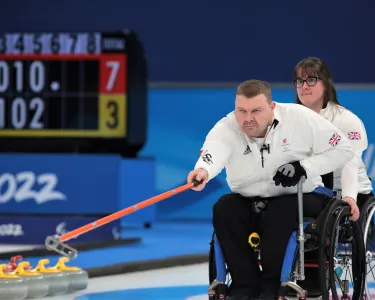
David Melrose’s journey from a paralysed firefighter to a Winter Paralympics competitor is a story of resilience and rediscovery. His life was irrevocably changed in 2010 when a falling steel beam left him paralyzed from the waist down while he was bravely battling a blaze in the Scottish Borders. This tragic incident forced him into a seven-month hospital stay and a lengthy period of rehabilitation. Despite the profound impact on his life, Melrose’s spirit remained unbroken, driven by a need to find purpose and fulfillment in his new reality.
Before the accident, Melrose was an active and accomplished sportsman, engaging in golf, badminton, and even playing semi-professional football as a goalkeeper. The sudden transition to life in a wheelchair was a monumental challenge, both physically and mentally. The first few years post-accident were spent grappling with his disability and adapting to his changed circumstances. It was a period marked by introspection and adjustment, as he worked to come to terms with his new life.
However, despite his best efforts to adapt, Melrose felt a void within himself after several years. It wasn’t until he discovered wheelchair curling that he began to feel a sense of completeness again. His wife, Sheila, had noticed the same change and encouraged him to pursue this new sport more seriously. Melrose’s commitment to curling not only reinvigorated his spirit but also allowed him to reconnect with his family on a deeper level. His children noticed the positive transformation, remarking to Sheila Swan, the British wheelchair curling head coach, that it was good to have their father back. This reaffirmation from his family was a powerful testament to the role curling played in Melrose’s recovery and self-realization.
Melrose’s introduction to the British Curling programme in 2018 marked a significant milestone in his journey. His participation in the team that clinched world silver in Stirling the following year highlighted his talent and dedication. Now, at 56, he is preparing to make his Winter Paralympics debut as part of an all-Scottish Team GB, competing in China between March 5 and 12. His teammates include fellow Scots Gregor Ewan, Hugh Nibloe, Meggan Dawson-Farrell, and Charlotte McKenna.
Melrose’s story is not just about personal triumph but also about the importance of mental health support. During his rehabilitation, he initially masked his true feelings to avoid burdening his family. Fortunately, the fire brigade arranged cognitive behavioral therapy sessions for him, which played a crucial role in helping him navigate the psychological challenges of his injury. This support was instrumental in his emotional recovery and readiness to face new challenges.
As he approaches the Paralympics, Melrose remains focused on making the most of this opportunity. He is confident in his team’s ability to compete at the highest level and is determined to embrace the experience fully. His goal is not just to compete but to enjoy the Games and perform at his best. For Melrose, the Winter Paralympics represent not just a sporting achievement but also a personal victory—proof that he has indeed found his sense of completeness again.
Be the first to comment